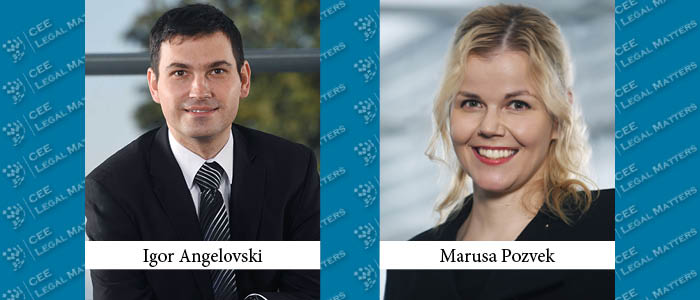Partners Jan Sibincic, Matic Novak, and Nina Cuden have recently announced the launch of their new firm: Sibincic Novak & Partners has opened its doors in Ljubljana.
Did You Know: 2023 Leaderboards in Bosnia and Herzegovina, Moldova, Montenegro, North Macedonia, and Slovenia
Did you know that, using the Activity Rankings function of the CEELMDirect website, you can look up the 2023 deal leaderboards in each CEE market, including Bosnia and Herzegovina, Moldova, Montenegro, North Macedonia, and Slovenia?
Changes of the Value Added Tax Act (ZDDV-1) in Slovenia from January 1, 2024
In a recent update to the VAT Act in Slovenia, notable amendments have been introduced, particularly focusing on services in the public interest. Article 42(1)(5) of the VAT Act has changed, emphasizing VAT exemptions exclusively for services provided within activities deemed in the public interest.
Nlaw Appoints Martin Hren as Managing Partner in Croatia and Katya Mezek To Lead Newly Opened US Office
Nlaw Partner Martin Hren has become the new Managing Partner of the firm's Croatian office. At the same time, Nlaw announced the opening of its US office with Of Counsel Katya Mezek at the helm.
Austria's Mariella Kapoun and Georg Gutfleisch and Slovenia's Amela Zrt and Ivan Kranjec Make Partner at CMS
Mariella Kapoun and Georg Gutfleisch have become Partners at CMS in Austria, while Amela Zrt and Ivan Kranjec have become Partners at CMS in Slovenia, as part of the firm's latest promotion round.
Schoenherr Appoints Seven New Partners in Poland, Romania, Serbia, Slovakia, and Slovenia
Poland's Weronika Kapica and Daria Rutecka, Romania's Adina Damaschin and Mara Moga-Paler, Serbia's Zoran Soljaga, Slovakia's Michal Lucivjansky, and Slovenia's Peter Gorse have all been appointed to Partner positions with Schoenherr.
Drakopoulos Joins South East Legal Alliance
Drakopoulos has become a part of the South East Legal Alliance, thus expanding the network’s reach to Athens, Bucharest, and Nicosia.
Masa Kramar, Eva Rop, Matija Urankar, and Marusa Senica Make Partner at Senica
Masa Kramar, Eva Rop, Matija Urankar, and Marusa Senica have all been promoted to Partner positions with the Senica law firm in Ljubljana.
Closing: Sale of Cargo-Partner Subsidiaries to Nippon Express Now Closed
On January 4, 2024, Boyanov & Co announced that the EUR 1.4 billion sale of Cargo-Partner subsidiaries to Nippon Express (reported by CEE Legal Matters on May 17, 2023) had closed.
Wolf Theiss Advises Joint Lead Managers on EUR 1.5 Billion Republic of Slovenia Note Issuance
Wolf Theiss has advised joint lead managers Barclays, BNP Paribas, Deutsche Bank, Erste Group, Goldman Sachs Bank Europe, and Nova KBM on the Republic of Slovenia’s EUR 1.5 billion Reg S note issuance.
Slovenia: Assessing the Reasonableness of the Primacy of Family Over Economic Ties in Determining an Individual’s Tax Residence
How tax residence is determined is one of the key tax issues that dictate in which country an individual’s worldwide income will be taxed. Primarily, tax residence is determined by domicile and center of economic and personal interests. Uncertainty arises when the decision cannot be made on the basis of residence alone and the economic and personal interests are not in the same country.
CEE M&A Outlook: Steady As She Goes
With CMS’s recently published European M&A Outlook report taking the temperature of the M&A activity across the continent, CMS Romania Managing Partner Horea Popescu and CMS Vienna Partner Alexander Rakosi share their insights on M&A trends in the CEE region.
Slovenia: What Changes Are on the Horizon for Labor Law?
For more than half a year, Slovenia has been intensively preparing amendments to the Employment Relationship Act (ZDR-1), which is usually called the “little workers’ constitution.” Like any other exemplary EU country, we transpose and implement all EU regulations and directives into our legal order in as timely and effective manner as possible. Unfortunately, this often does not solve the most acute problems of the labor market and the adopted legal solutions do not always help the economy to achieve higher productivity.
ODI Law Advises Tus Holding and AH Invest 1 on Sale of Engrotus to Fortenova
ODI Law has advised Tus Holding and AH Invest 1 on the sale of Engrotus to Fortenova. Rojs, Peljhan, Prelesnik & Partners reportedly advised Fortenova subsidiary Mercator.
Floods and Taxes in Slovenia: A Buzz Interview with Andrej Fatur of Fatur & Menard
With the aftermath of the devastating floods that hit Slovenia this year still being felt across multiple sectors, the country is also facing legal challenges – from new taxation policies to upheavals in the healthcare system – according to Fatur Menard Partner Andrej Fatur.
Amendment to Slovenia’s Employment Relationships Act
On 7 November 2023, the National Assembly of the Republic of Slovenia adopted an amendment to the Employment Relationships Act (“ERA-1D“) that entered into force on 16 November 2023.
Slovenia Rolls Up Its Sleeves: A Buzz Interview with Minu Gvardjancic of Ketler & Partners, Member of Karanovic
In the wake of catastrophic floods, Slovenia has been grappling with several legal and economic challenges as well – from implementing healthcare reform to combating high inflation – according to Minu Anamaria Gvardjancic, a Partner of Ketler & Partners, member of Karanovic.
Slovenia: Unveiling the DMA – Safeguarding Open Markets in the Digital Sphere and Its Impact on Slovenia
The initiation of the European Union’s Digital Markets Act (DMA) on May 2, 2023 marked a pivotal turning point in digital markets. Designed to counteract the monopoly-like tendencies of so-called “gatekeepers” – large online platforms wielding significant power – the DMA is revolutionizing the digital space. However, its implications extend beyond these giant companies, and it’s essential to examine the impact on smaller EU members like Slovenia.

































